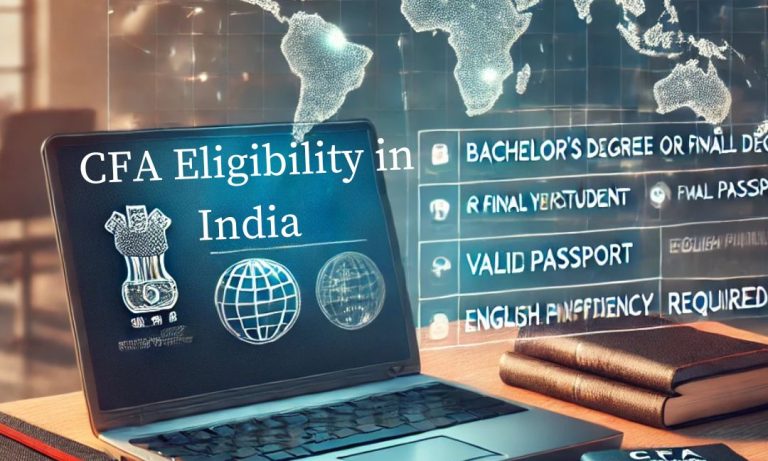CFA Eligibility in India is the set of eligibility criteria that candidates must satisfy to pursue the Chartered Financial Analyst (CFA) program in India. The CFA program, offered by the CFA Institute, is one of the most prestigious qualifications in the field of finance and investment management. Elucidating the eligibility criteria for prospective candidates is an essential factor since it helps to decide whether they qualify for applying for the CFA exams, which are an entrance point to a career in investment management, financial analysis, and more. We’ll examine here the different eligibility requirements of the CFA program in India, how to apply, and a few significant details about the exams.
1. Introduction to CFA Eligibility in India
The CFA program is a global leading certification for investment professionals. It offers people an opportunity to advance their careers in finance, investment banking, portfolio management, and research analysis. Knowing the CFA Eligibility in India is vital for anyone who intends to sit for the CFA exams and work in the financial sector.
Key Eligibility Criteria for CFA in India:
- Educational Qualifications: A bachelor’s degree (or equivalent) is required to register for the CFA exams. Alternatively, candidates who are in the final year of their undergraduate degree are also eligible to apply.
- Work Experience: While no work experience is required for registering for Level I, candidates must have 4 years of professional work experience in investment decision-making to attain the CFA charter after passing the exams.
2. Detailed Breakdown of CFA Eligibility Requirements
The eligibility criteria in the CFA program mainly include three primary components namely, educational qualifications, professional experience at work, and adherence to the code of ethics and conduct by the CFA Institute. Let’s explain these one after the other in detail.
2.1 Educational Qualifications
The educational requirements for CFA Eligibility in India are straightforward but important:
- Undergraduate Degree: Candidates must have a bachelor’s degree or its equivalent from any recognized university. This degree can be in any discipline, such as commerce, engineering, science, or arts.
- Final-Year Students: Candidates who are in their final year of undergraduate studies can also apply for the CFA Level I exam, but they will need to complete their degree before registering for the subsequent levels (Level II and Level III).
- Professional Qualifications: Those holding professional qualifications like CA, CS, or CWA are also eligible to apply, even if they do not possess a traditional undergraduate degree.
2.2 Work Experience
While work experience is not mandatory to register for the CFA Level I exam, it becomes a requirement for earning the CFA charter:
- Level I and II: No work experience is needed to appear for the CFA Level I and Level II exams. However, candidates should complete their work experience requirement before applying for Level III.
- 4 Years of Professional Work Experience: To qualify for the CFA Charter after passing the exams, candidates must have at least 4 years (48 months) of professional work experience in roles such as financial analyst, portfolio manager, investment banker, or other positions involving investment decision-making.
2.3 Professional Conduct
The CFA Institute expects all candidates to adhere to its code of ethics and professional conduct. Ethical standards are critical to the CFA designation, and candidates must:
- Agree to the CFA Institute’s Code of Ethics and Standards of Professional Conduct.
- Abide by the CFA Institute’s Conduct Guidelines throughout their career and while taking the exams.
3. CFA Levels and Exam Structure in India
The CFA program is divided into three levels: Level I, Level II, and Level III. Each level tests a different skill set, with increasing difficulty. Candidates must pass each level before advancing to the next.
3.1 CFA Level I
The Level I exam focuses on basic knowledge and comprehension of investment tools and ethical standards. The structure includes:
- Multiple-Choice Questions (MCQs): The Level I exam consists of 240 multiple-choice questions divided into two sessions (morning and afternoon).
- Subjects Covered: Topics include quantitative methods, economics, financial reporting, corporate finance, ethics, and more.
3.2 CFA Level II
Level II builds on the knowledge gained in Level I and focuses on asset valuation, financial reporting analysis, and corporate finance. The exam format includes:
- Item Set Questions: The Level II exam includes 20 item sets, with each set having a case study followed by 6 multiple-choice questions.
- Advanced Topics: Topics such as equity analysis, fixed-income analysis, portfolio management, and financial statement analysis are covered in detail.
3.3 CFA Level III
The Level III exam is the final stage and focuses on portfolio management and wealth planning. The exam format consists of:
- Constructed-Response (Essay) and Item Set Questions: Level III contains essay-type questions and item sets that test the ability to apply concepts to real-world scenarios.
4. Registration Process for CFA Eligibility in India
To begin the CFA journey in India, candidates need to follow a structured registration process. Here’s a breakdown of the steps involved:
4.1 Create an Account with CFA Institute
- Online Registration: The first step for CFA Eligibility in India is to create an online account with the CFA Institute. Candidates can visit the official CFA website and create an account.
4.2 Select the Exam Level and Pay the Fees
- Level Selection: Based on your educational qualifications, you can select the exam level you wish to appear for (Level I, II, or III).
- Fee Payment: After selecting the level, you must pay the exam fees. The fees for each level vary and can be paid online via debit/credit cards.
4.3 Submit Necessary Documents
- Documents: For the eligibility verification, you may need to submit documents such as your degree certificate, work experience details (for Levels II and III), and proof of identity.
4.4 Schedule Exam Date
Once the payment is processed and eligibility verified, candidates can schedule their exam dates according to the available slots. CFA exams are held twice a year (in June and December), with the Level I exam offered in both windows, while Level II and III exams are usually only held in June.
Conclusion
CFA Eligibility in India is based on a combination of educational qualifications, professional work experience, and ethical standards. The CFA program offers immense value to those aspiring to enter the field of finance and investment management. Proper preparation and understanding of the eligibility criteria will ensure that candidates can successfully embark on their journey towards becoming a CFA charterholder. Completing three levels of CFA exams gives the candidates a most prestigious qualification leading to opportunities of pursuing various career streams in finance.
CFA Eligibility in India FAQs
What are the minimum educational qualifications for CFA Eligibility in India?
The candidates must hold a bachelor’s degree or its equivalent. Final-year students are also eligible to apply for the Level I exam.
Is work experience a requirement for CFA eligibility in India?
Work experience is not a requirement to sit for the Level I and Level II exams. However, a candidate needs to complete 4 years of professional work experience in investment decision-making before sitting for the Level III exam and receiving the CFA charter.
Can I apply for the CFA Level I exam in India if I am in my final year of college?
Yes, final-year undergraduate students are eligible to apply for the Level I exam but must complete their degree before appearing for the Level II exam.
How do I register for the CFA exams in India?
Registration for the CFA exams in India can be done by creating an account on the official website of the CFA Institute, then selecting the exam level, paying the fees, and scheduling the exam date.
What is the fee for the CFA exams in India?
The fees are different for each level, and also depend on the time when the candidate applies. Early registration is less expensive, with fees between $700 and $1,000 (approximately ₹50,000-₹75,000) for each level of the exam.


